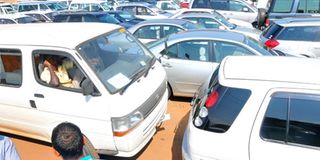EAC move to assemble vehicles to eat into Uganda’s revenue

A car bond in Kampala. Uganda earns billions of Shillings from taxes on car imports. FILE PHOTO
What you need to know:
- Already, efforts are underway at Uganda Kiira Motors Corporation (KMC) to manufacture vehicles with production expected to start in 2018.
- According to an American-based consulting company, RLE International, that conducted the Kiira Motors Business case, the development of infrastructure is estimated to cost $36m (Shs121b).
Kampala. A strategy to promote local assembling of vehicles in East African countries may see Uganda lose heavily in customs duties collected daily.
According to Uganda Revenue Authority (URA) statistics every day Uganda imports about 100 vehicles from countries such as Japan, Germany, UK and United Arab Emirates.
The records mean every month URA collects between Shs28 billion and Shs35 billion worth of taxes from car imports alone. This is a minimum of Shs840 billion monthly.
In an interview with Daily Monitor, URA manager customs, Mr Abel Kagumire said: “Local assembling of vehicles may affect customs duties but will improve the domestic tax collection.”
Regulation
Latest information from the EAC Sectoral Council on Trade, Industry, Finance and Investment (SCTIFI) which concluded on February 3 reported progress so far made in seeing that the draft Regulation on Motor Vehicle Assemblers is implemented soon.
In an interaction with Ms Lillian Awinja, the executive director East African Business Council (EABC), who attended the meeting informed this newspaper that the SCTIFI considered the progress study report on the promotion of automotive industry in EAC which is expected to be finalised in April 2017.
“Furthermore SCTIFI directed the Secretariat to undertake a comprehensive regional study to ascertain the production and available capacities on the list of items for inclusion and exclusion from the Completely Knocked Down kits for vehicles assembly and body building materials for trailers,” Ms Awinja shared.
She, however, said that the SCTIFI allowed partner states to continue using their regulations on motor vehicle assembly until the finalisation of the EAC Motor Vehicle Regulations.
The idea of developing the automobile assembly in the region is being promoted with the aim of cutting back on the huge import bill spent on importation of second-hand vehicles.
The EAC heads of states argue that assembling within in the region will also create jobs for the youth.
Efforts
Already, efforts are underway at Uganda Kiira Motors Corporation (KMC) to manufacture vehicles with production expected to start in 2018.
In an earlier interview with this newspaper, Mr Paul Isaac Musasizi, the chief executive officer KMC, said the company’s products will include Sedans, pick-ups, crosser-overs, buses and trucks.
A Sedan will cost $25,000 (Shs89m), a Crossover $28,000 (Shs100m) and $32,000 (Shs114m) for a Pick-up truck.
“Production starts in 2018 with 305 vehicles and is expected to be at full capacity of 60,000 vehicles per year by 2039,” said Mr Musasizi.
According to an American-based consulting company, RLE International, that conducted the Kiira Motors Business case, the development of infrastructure is estimated to cost $36m (Shs121b).
In Kenya Vehicle Manufacturer (KVM) - assemblers of CMC and DT Dobie’s trucks and heavy commercial vehicles such as the Nissan double-cab pick-ups, Land Rover, Mazda, Iveco, and Mercedes Benz, Toyota Kenya, Associated Vehicle Assemblers (AVA) and General Motors East Africa (GMEA), are among local assemblers.




